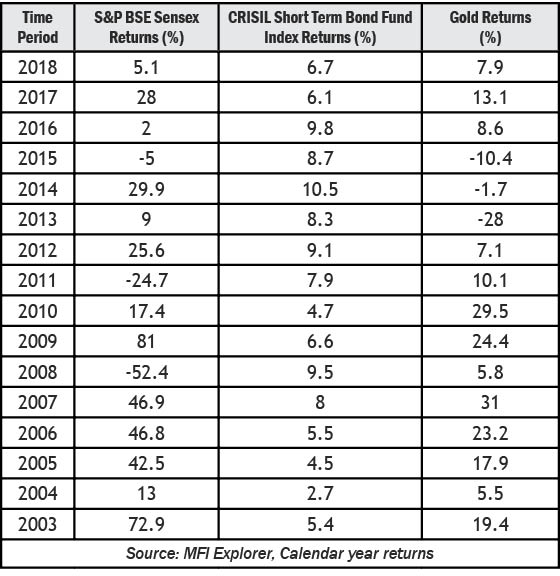 Nimesh Shah, Managing Director and CEO of ICICI Prudential AMC, shares with PT Readers an insight into Asset Allocation, Investment Patterns and Asset Allocator Funds.
Nimesh Shah, Managing Director and CEO of ICICI Prudential AMC, shares with PT Readers an insight into Asset Allocation, Investment Patterns and Asset Allocator Funds.
ASSET ALLOCATION: The Key Determinant for Portfolio Perfor mance
When it comes to creating long term wealth, one of the key factors aiding an investor here is asset allocation. Based on the principle of diversification, asset allocation helps in limiting risks and reducing volatility in returns. An effective asset allocation can be considered as one wherein appropriate allocation to the right asset class is made at a right time. This is because in a market cycle, at different points in time, different asset classes may tend to perform well.
Importance of Asset Allocation: If we look at the historical data of various asset classes, in terms of returns generated, we can deduce that winners (asset classes) have kept on rotating over the years. This is because various asset classes perform based on market cycle, which is different for each asset class.ll in contracting economies. So, a shift of allocation between asset classes holds the potential for a smoother investment journey. With this one can safely conclude that allocation towards the right asset class is a key determinant for portfolio performance in the long run. Research has proven that 91.5% of the times Asset Allocation is the key determinant for portfolio performance, followed by Securities Selection (at 4.6%).
Typical Investment Pattern: Be fearful when others are greedy and be greedy when others are fearful is an often heard saying attributed to legendary market investor, Warren Buffet. When it comes to asset allocation, especially in case of equity investments, ‘buy low and sell high’ is the way to go. Even though this solution may look simple, when it comes to implementation investors frequently end up doing the opposite. Investors have a tough time keeping emotional biases at bay. This is after knowing that outsized gains can be made only when investing against the tide rather than with it. In case of debt, investors tend to opt to traditional investment options which one is comfortable investing in, irrespective of which way the interest rate is headed. Lastly, when it comes to the yellow metal, the investment pattern here tends to be random in nature, mainly driven by the emotional value attached to the purchases made, especially in the form of jewellery.
Given this approach, the allocation tends to be static in nature, with re-balancing being an activity which is done as an afterthought rather than being proactive. In such an investment approach, an investor tends to lose out on the changing attractiveness of an asset class, which an asset allocator fund can provide to its investors.

Asset Allocator Funds:
This category of funds captures optimum allocation of various asset classes (Debt/Equity/Gold) based on the attractiveness of one asset class over the other. Here, the fund manager positions the portfolio in a manner which can make the most of the market cycle playing out, at any point in time. In effect, the fund manager helps an investor to be invested in the right asset class at the right time thereby helping generate long term wealth. The fund manager would take into consideration the market valuations of both equity and debt independently because the right allocation is not only dependent on equity valuation, but also considers the opportunities that available in debt market. In effect, the working of this fund ensures that the portfolio is rebalanced as per the attractiveness of the asset classes under consideration. For an investor, such a category of fund comes in handy, given that one needn’t be clued into market developments in order to switch between asset classes. Also, it saves one from the operational hassles, taxation and probable exit load that an investment may face owing to switching investments across funds.
To sum up, an investor should consider this fund to be a part of the portfolio, especially in case of lump sum investments, owing to its active asset allocation thereby allowing diversification between asset classes.
ICICI Prudential Asset Management Company Ltd. is a leading asset management company (AMC) in the country focused on bridging the gap between savings & investments and creating long term wealth for investors through a range of simple and relevant investment solutions. Bottom of Form
Top of Form
The AMC manages significant Assets under Management (AUM) in the mutual fund segment. The AMC also caters to Portfolio Management Services for investors, spread across the country, along with International Advisory Mandates for clients across international markets in asset classes like Debt, Equity and Real Estate. Bottom of Form
Top of Form
Driven by an entirely investor centric approach, the organization today is a suitable mix of investment expertise, resource bandwidth and process orientation. The AMC endeavors to simplify its investor’s journey to meet their financial goals, and give a good investor experience through innovation, consistency and sustained risk adjusted performance.

- PPM Organises Pilgrimage To Iranshah - 5 April2025
- PPP Moves To Protect Sacred Trust Land From Encroachment - 5 April2025
- Meherzin Randeria – Rising Literary Star - 5 April2025
